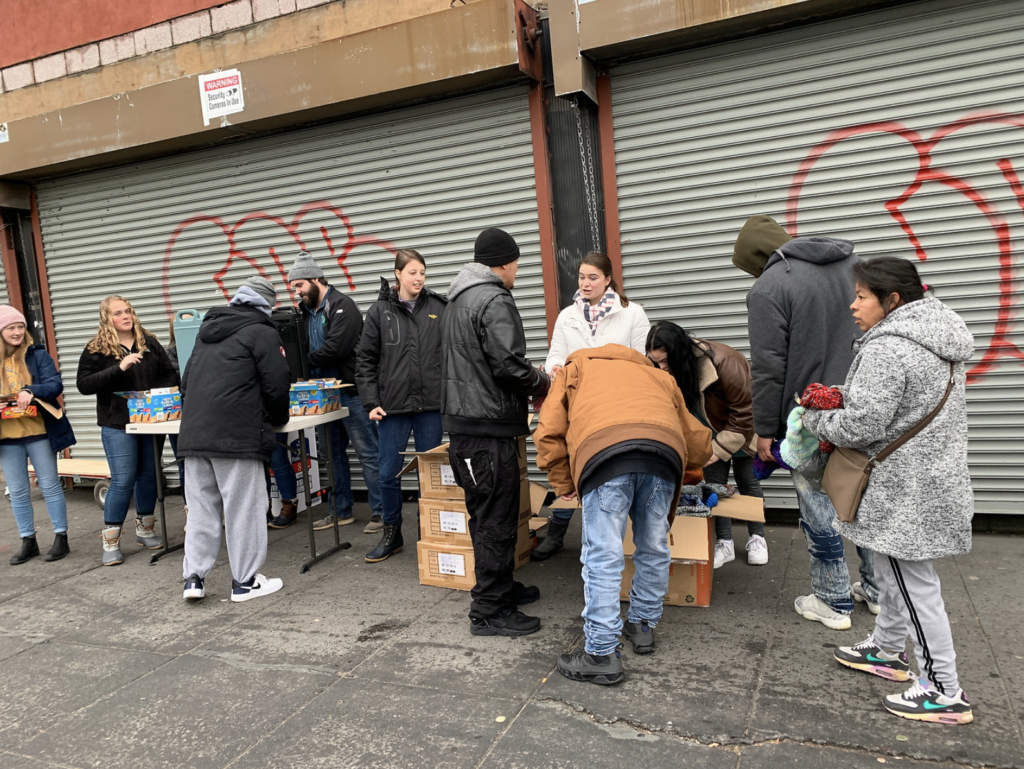All along the street, heroin addicts were huddled in groups against the wall.
A man hunched over the icy sidewalk, trying to hide what he was doing behind the shield of a worn-out parka.
This particular community was new to me, and I was questioning how I could possibly reach the hurting people of the South Bronx when I grew up on the quiet plains of Oklahoma.
I had just watched a brave, sincere church group drive in from Pennsylvania to try to hand out tracts in this neighborhood. But these men and women were preoccupied, refusing to make eye contact and tossing out the pamphlets being offered. As a group, New Yorkers experiencing homelessness didn’t seem too open to outsiders.
So, I decided to try something simpler to help meet their physical needs—hot coffee.
I drove to a local donut shop, bought their biggest box of coffee and had them mix in lots of milk and sugar. Then, I carried my “box of Joe” towards the nearest group of weary people.
I instantly recognized one man as the security guard for a small store on the block. We had shared coffee and spoken before about his six children and seven grandchildren in West Africa.
“There’s my pastor!” he shouted as I walked down the block. This greeting was strange for two reasons: I never told him I was a pastor, and he had strongly confirmed that his entire family was proudly Muslim. Intrigued, I poured him a cup of coffee and waited while he took some to his co-worker.
As we talked, another woman, Rosa, walked up, and I offered her a cup of coffee. Rosa immediately wanted to make sure I was enjoying own cup of coffee. Once I showed her my cup, I poured hers, and soon, she was the one who became the host of the street. I watched as she gathered men and women who probably wouldn’t give me the time of day. Quickly, stragglers formed circles, laughing and introducing themselves.
Then, the topic turned to God.
Rosa began boldly proclaiming the goodness of God and her belief in Jesus Christ, declaring it right there on the streets. As others listened and sipped their coffee, Rosa said she knew she needed to find a church.
“Well,” I asked, “why can’t church be right here on the sidewalk?”
The group grinned, and some started nodding their heads. I wasn’t being flippant—at that moment, we had some very broken people proclaiming Christ’s forgiveness loudly on the street, and other seekers listening.
Each person there found joy in the fact that we were all reaching out far beyond our own backgrounds. It felt like the kingdom of God.
It was such a relief for me to realize that I didn’t require a comfortable, rented space or a screen with good graphics or a seasoned worship band (though Rosa did offer to bring her tambourine next time).
We even had our first offering!
A stranger walked by and, after watching the surprising goodwill among the addicts and the homeless, they pulled out $20 so that we could hold our street church again. It was an honor to receive that donation for the group–my very own holy moment on the street.
After our group dispersed, Rosa walked me past her place in the projects. She told me how tough her life was, starting in her birthplace of Puerto Rico.
She shared how her 22-year-old grandson couldn’t see her anymore and pointed to the building where a gang had beat him up. She began crying as she described how her grandson had severe mental health problems and was now living on the street. She had lost track of her daughter as well. “She might be dead,” Rosa said, shaking her head.
After looking around, she carefully pulled a folded piece of money from her worn coat pocket and handed it to me “to help us do this coffee thing again.”
I stopped in my tracks—I couldn’t possibly take her money. Rosa needed it so much more than I did. I almost refused her outright, but then some stories in the Bible began welling up inside me.
I thought of Jesus crossing all barriers of race, gender and religion by asking the Samaritan woman for water and the tax collector, Zacchaeus, for food. These scenes flashed before me, as I took the little green bill from Rosa and said, “Thank you so much. Your gift will bless others.”
Later, I unfolded her donation. It was a $20 bill.
As I carefully handed Rosa’s gift to my fellow ministry leader, I told him, “This is sanctified money.”
Send Relief works with communities across the nation and across the world, but none of them are quite like the South Bronx. However, we are all working together to find the right ways to reach our communities and are learning that this simple principle can be applied anywhere: it is better to share than to give—to drink your cup of Joe with a person, not give coffee to a person.
Taylor Field is a Send Relief missionary serving in New York City.
Published March 24, 2022
